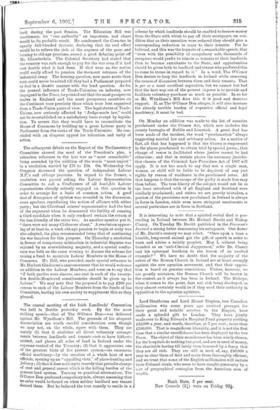The annual meeting of the Irish Landlords' Convention was held
in Dublin yesterday week. By far the most striking speech—that of The O'Conor Don—was delivered against Mr. Wyndham's Bill. The grounds of his eloquent denunciation are worth careful consideration even though we may not, on the whole, agree with them. They are mainly (1) that it abolishes all direct voluntary arrange- ments between landlords and tenants such as have hitherto existed, and places all sales of land in Ireland under the supreme control of the Treasury; (2) that it aggravates one of the greatest blots of the present system—its enormous official machinery—by the creation of a whole host of new officials, opening up an " appalling vista" of place-hunting and jobbery; (3) that it does nothing to remedy that periodic change of rent and general unrest which is the killing burden of the Present land system. Turning to practical alternatives, The O'Conor Don preferred compulsory sale, always assuming that no sales would be forced on when neither landlord nor tenant desired them. But he believed the true remedy to reside in a
scheme by which landlords should be enabled to borrow money from the State with which to pay off their mortgages, on con- dition that as their annuities were reduced they should give a corresponding reduction in rents to their tenants. For he believed, and this was the keynote of a remarkable speech, that "even with the possibility of compulsory sale, thousands of occupiers would prefer to remain as tenants to their landlords than to become annuitants to the State, and opportunities should be given both to landlord and tenant who preferred this to come to terms in regard to it." In a word, The O'Conor Don desires to keep the landlords in Ireland while removing the causes of dissension between them and their tenants. That is per• se a most excellent aspiration, but we cannot but feel that the best way out of the present impasse is to provide and facilitate voluntary purchase as much as possible. In so far as Mr. Wyndham's Bill does this it is good and deserves support. If, as The O'Conor Don alleges, it will also increase the already terrible burden of expensive official and legal machinery, it must be bad.






































 Previous page
Previous page